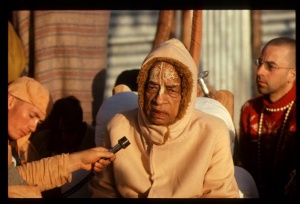CC Antya 1.148: Difference between revisions
m (1 revision(s)) |
No edit summary |
||
| Line 1: | Line 1: | ||
{{ | [[Category:Sri Caitanya-caritamrta - Antya-lila Chapter 01|C148]] | ||
<div style="float:left">'''[[Sri Caitanya-caritamrta|Śrī Caitanya-caritāmṛta]] - [[CC Antya|Antya-līlā]] - [[CC Antya 1|Chapter 1: Śrīla Rūpa Gosvāmī's Second Meeting With the Lord]]'''</div> | |||
<div style="float:right">[[File:Go-previous.png|link=CC Antya 1.147|Antya-līlā 1.147]] '''[[CC Antya 1.147|Antya-līlā 1.147]] - [[CC Antya 1.149|Antya-līlā 1.149]]''' [[File:Go-next.png|link=CC Antya 1.149|Antya-līlā 1.149]]</div> | |||
{{CompareVersions|CC|Antya 1.148|CC 1975|CC 1996}} | |||
{{RandomImage}} | |||
==== TEXT 148 ==== | ==== TEXT 148 ==== | ||
<div class="verse"> | |||
<div | :pīḍābhir nava-kālakūṭa-kaṭutā-garvasya nirvāsano | ||
pīḍābhir nava-kālakūṭa-kaṭutā-garvasya nirvāsano | :nisyandena mudāṁ sudhā-madhurimāhaṅkāra-saṅkocanaḥ | ||
nisyandena mudāṁ sudhā-madhurimāhaṅkāra-saṅkocanaḥ | :premā sundari nanda-nandana-paro jāgarti yasyāntare | ||
premā sundari nanda-nandana-paro jāgarti yasyāntare | :jñāyante sphuṭam asya vakra-madhurās tenaiva vikrāntayaḥ | ||
jñāyante sphuṭam asya vakra-madhurās tenaiva vikrāntayaḥ | |||
</div> | </div> | ||
| Line 15: | Line 18: | ||
==== SYNONYMS ==== | ==== SYNONYMS ==== | ||
<div class="synonyms"> | |||
<div | ''pīḍābhiḥ''—by the sufferings; ''nava''—fresh; ''kāla-kūṭa''—of poison; ''kaṭutā''—of the severity; ''garvasya''—of pride; ''nirvāsanaḥ''—banishment; ''nisyandena''—by pouring down; ''mudām''—happiness; ''sudhā''—of nectar; ''madhurimā''—of the sweetness; ''ahaṅkāra''—the pride; ''saṅkocanaḥ''—minimizing; ''premā''—love; ''sundari''—beautiful friend; ''nanda-nandana-paraḥ''—fixed upon the son of Mahārāja Nanda; ''jāgarti''—develops; ''yasya''—of whom; ''antare''—in the heart; ''jñāyante''—are perceived; ''sphuṭam''—explicitly; ''asya''—of that; ''vakra''—crooked; ''madhurāḥ''—and sweet; ''tena''—by him; ''eva''—alone; ''vikrāntayaḥ''—the influences. | ||
</div> | </div> | ||
| Line 23: | Line 25: | ||
==== TRANSLATION ==== | ==== TRANSLATION ==== | ||
<div class="translation"> | |||
<div | " 'My dear beautiful friend, if one develops love of Godhead, love of Kṛṣṇa, the son of Nanda Mahārāja, all the bitter and sweet influences of this love will manifest in one 's heart. Such love of Godhead acts in two ways. The poisonous effects of love of Godhead defeat the severe and fresh poison of the serpent. Yet there is simultaneously transcendental bliss, which pours down and defeats the poisonous effects of a snake, as well as the happiness derived from pouring nectar on one 's head. It is perceived as doubly effective, simultaneously poisonous and nectarean.' " | ||
</div> | </div> | ||
==== PURPORT ==== | ==== PURPORT ==== | ||
<div class="purport"> | |||
This verse is from the ''Vidagdha-mādhava'' (2.18). It also appears in the ''Madhya-līlā'' ([[CC Madhya 2.52|Chapter Two, verse 52]]). It is spoken by Paurṇamāsī. | |||
</div> | |||
<div | <div style="float:right; clear:both;">[[File:Go-previous.png|link=CC Antya 1.147|Antya-līlā 1.147]] '''[[CC Antya 1.147|Antya-līlā 1.147]] - [[CC Antya 1.149|Antya-līlā 1.149]]''' [[File:Go-next.png|link=CC Antya 1.149|Antya-līlā 1.149]]</div> | ||
__NOTOC__ | |||
</div> | __NOEDITSECTION__ | ||
__NOTOC__ | |||
Revision as of 10:08, 12 September 2021

A.C. Bhaktivedanta Swami Prabhupada
TEXT 148
- pīḍābhir nava-kālakūṭa-kaṭutā-garvasya nirvāsano
- nisyandena mudāṁ sudhā-madhurimāhaṅkāra-saṅkocanaḥ
- premā sundari nanda-nandana-paro jāgarti yasyāntare
- jñāyante sphuṭam asya vakra-madhurās tenaiva vikrāntayaḥ
SYNONYMS
pīḍābhiḥ—by the sufferings; nava—fresh; kāla-kūṭa—of poison; kaṭutā—of the severity; garvasya—of pride; nirvāsanaḥ—banishment; nisyandena—by pouring down; mudām—happiness; sudhā—of nectar; madhurimā—of the sweetness; ahaṅkāra—the pride; saṅkocanaḥ—minimizing; premā—love; sundari—beautiful friend; nanda-nandana-paraḥ—fixed upon the son of Mahārāja Nanda; jāgarti—develops; yasya—of whom; antare—in the heart; jñāyante—are perceived; sphuṭam—explicitly; asya—of that; vakra—crooked; madhurāḥ—and sweet; tena—by him; eva—alone; vikrāntayaḥ—the influences.
TRANSLATION
" 'My dear beautiful friend, if one develops love of Godhead, love of Kṛṣṇa, the son of Nanda Mahārāja, all the bitter and sweet influences of this love will manifest in one 's heart. Such love of Godhead acts in two ways. The poisonous effects of love of Godhead defeat the severe and fresh poison of the serpent. Yet there is simultaneously transcendental bliss, which pours down and defeats the poisonous effects of a snake, as well as the happiness derived from pouring nectar on one 's head. It is perceived as doubly effective, simultaneously poisonous and nectarean.' "
PURPORT
This verse is from the Vidagdha-mādhava (2.18). It also appears in the Madhya-līlā (Chapter Two, verse 52). It is spoken by Paurṇamāsī.